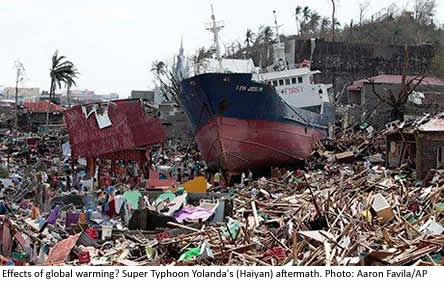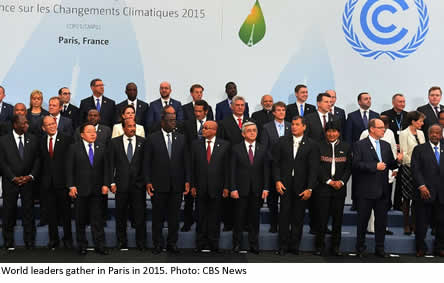|

 he
time for finger pointing has passed. It no longer matters if other
countries spew more greenhouse gases into the atmosphere than the
Philippines does. We need to get our act together because we Filipinos
have—to put it bluntly—destroyed this beautiful country of ours. From
its denuded forests to its over-fished seas, from its overbuilt cities
to its polluted rivers and streams, from the smog-choked air above
cities to the depleted water tables beneath them, the Philippines today
is a far cry from the land Jose Rizal once called his "Pear of the
Orient." he
time for finger pointing has passed. It no longer matters if other
countries spew more greenhouse gases into the atmosphere than the
Philippines does. We need to get our act together because we Filipinos
have—to put it bluntly—destroyed this beautiful country of ours. From
its denuded forests to its over-fished seas, from its overbuilt cities
to its polluted rivers and streams, from the smog-choked air above
cities to the depleted water tables beneath them, the Philippines today
is a far cry from the land Jose Rizal once called his "Pear of the
Orient."
If we do nothing, we
Filipinos of today will pass on to our children a Philippines in far
worse shape than the one we inherited from our parents. And the sad part
is that it will take several generations to undo all the damage we
created.
Global warming,
global problem
Aside from our own
irresponsible stewardship of the land, industrial development and the
burning of fossil fuels on a global scale has caused average
temperatures to rise with dire consequences for the entire planet. The
earth's climate has now been thrown into disarray. Sea levels are rising
due to melting polar ice caps; super storms are occurring with greater
frequency; planting and harvesting periods for many crops have been
thrown out of whack
(read related article
below).
If humans continue to
generate greenhouse gases at current levels, the earth would reach a
tipping point were the damage to the environment becomes irreversible.
Then the earth's fragile eco system could collapse bringing with it most
living things ... including humans. At present, there is growing
consensus that the increasing concentration of greenhouse gases in the
atmosphere is bringing about undesired climatic changes to the entire
planet.
Local action brings
about global action
The UN Climate Change
Conference going on in Paris might be the first worldwide response to
global warming that nations and their leaders actually take seriously.
Going forward, each country must do its part to prevent this global
disaster from happening. As noted above, the period of pointing fingers
and blaming other countries for the problem is over. Each country must
instead do its level best to prevent global warming. Each political
subdivision within a country must accept this responsibility as well. In
the Philippines, that would mean each region, province, city,
municipality, and barangay must do its part in cutting back greenhouse
gas emissions in their areas.

Pinoys will do their
part
There is a lot we
Filipinos can do when we finally get serious about doing our part in
this global effort. But before meaningful change can happen, the public
must be made fully aware of the danger global warming poses on future of
the planet. The government must institute an awareness campaign aimed at
all Filipinos—young and old alike. Natural disasters like Typhoon
Yolanda (Haiyan), floods, tsunamis, and the like will serve to reinforce
the dangers that global warming brings.
When that message
finally sinks in, Filipinos will begin to demand clean renewable energy
instead of the coal-burning power plants they have today. They will
start banning from their communities the two-stroke motorcycle engines
found in most tricycles today. They will begin to demand cleaner motor
vehicle engines. They will stop denuding forests and instead start
planting more trees. They will begin to change their wasteful, polluting
ways and become a more eco-friendly society.
Filipinos have always
been a resourceful, resilient people and know how to survive. All they
need is for their leaders (both public and private) to point them in the
right direction.
And when all the nations
of the world finally come together and address this global problem, you
can rest assured that Filipinos will be there standing shoulder to
shoulder with the rest of humanity, doing their part to save the planet.
12/05/2015
Why are emissions of carbon
dioxide (CO₂)
the most important substance causing climate change?
The short answer, according to Mr. Richard S. J. Tol, a
professor in the UK and the Netherlands, is that “uptake of
human emissions of ambient CO₂
is not balanced by natural uptake” in the carbon cycle*
Before the Industrial Revolution,
the carbon cycle was characterized by a counterbalancing flux of
“CO₂
. . . between the atmosphere, the ocean, and terrestrial
vegetation.” The large stock of carbon in fossil fuels “[i]n
natural circumstances . . . does not play a significant part in
the carbon cycle. However, human exploitation has mobilized this
carbon. Emissions of CO₂
from fossil fuel combustion are small compared with natural
emissions—but unlike natural emissions, there is no
counterbalancing flux.”
Professor Tol states that since CO₂
is removed from the atmosphere “at the rate at which rocks
grow,” “stabilization of the atmospheric concentration of CO₂
implies that CO₂
emissions have to go to zero” based on current learning.
“The 3 most important anthropogenic (produced by human
activities) greenhouse gases, ambient CO₂,
methane (CH₄),
and nitrous oxide (NO), have risen since the Industrial
Revolution.” Methane results from livestock and waste.
Agricultural soils give rise to nitrous oxide (NO).
Professor Tol states that “carbon dioxide is by far the most
important substance in the change in the Earth’s energy
balance.” “Put together, the other anthropogenic greenhouse
gases have contributed about two-thirds as much as carbon
dioxide to the total radiative forcing.” (Radiative Forcing (RF)
expresses the change in energy in the atmosphere due to
greenhouse gas emissions.)
Halocarbons, which result from aerosols, refrigerants, and
plastics, are another significant anthropogenic greenhouse
gas. CO₂,
methane, and nitrous oxide together with halocarbons sometimes
are referred to as “long-lived" greenhouse gasses. “Water vapor
is a greenhouse gas too, in fact the most important of them all,
but its concentration is only marginally affected by human
activity….”
“With greenhouse gases in the air, it is easier for energy to
enter the planet than to leave it.” “Higher greenhouse gases
imply warming—but how much is uncertain as there are many
complex feedbacks.”
Article 2 of the UN Framework Convention on Climate Change
states the primary objective of this Convention: “stabilization
of greenhouse gas concentrations in the atmosphere at a level
that would prevent dangerous anthropogenic interference with the
climate system.”
Professor Tol argues that “optimal emission reduction today
depends on expected climate policy in the future.”
* Tol, Richard
S.J.
Climate Economics: Economic Analysis of Climate, Climate Change
and Climate Policy. Cheltenham/Northampton: Edward Elgar, 2014 |
|